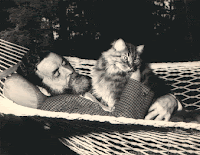
Rhododendrons were something of a revelation to me when I moved to the Pacific Northwest. Unassuming but noble most of the year, rhododendrons blossom extravagantly in Spring.
Soon we inhabited some homes with yards that included venerable "rhodies," and I became even more intrigued by them. Many gardeners give rhodies a great deal of attention, going so far as to pluck off the dried blossoms in late Spring/early Summer. I never did that, partly out of respect for the rhodies, which seemed quite self-sufficient to me. They do grow like mad, so sometimes pruning is called for. And they like some acidic fertilizer every now and then. --And water if the weather gets real hot. Otherwise, they just flourish: part of their charm, as far as I'm concerned. They provide some nice balance to roses, which require constant care, it seems.
Rhododendrons Without A Country
Rhododendrons in Canada and the U.S.
may be aware of a lot, but they don't know
they're Canadian or American. They're
even undecided about whether to be trees
or shrubs. Unsurprisingly, then, they bloom
cautiously. Vivid swatches of color peek
through grenade-size buds and give Spring
a good hard look to see if it's serious or
a double-agent working for Winter.
Rhododendrons never carry a passport
or negotiate treaties. They're model
citizens of forests, parks, and gardens.
Their leaves are leathery, seem wise.
Rhododendrons conduct business with
sun, soil, and rain. They exhibit a
cosmopolitan poise that rises
above petty nationalism.
Copyright 2009











